In a community that prizes unity, Passing on the Gift inspires unbreakable bonds.
Written by Alyssa Cogan and Oumar Diouk
Photographs by Alyssa Cogan and Sylvain Cherkoui
Originally published as part of Heifer International’s Strength in Sisterhood digital collection.
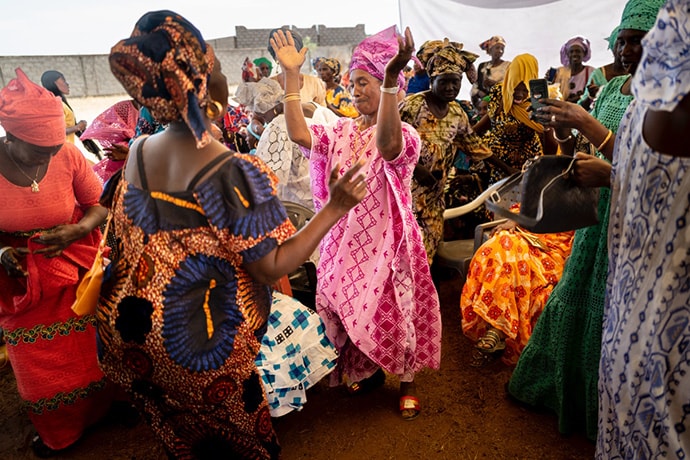
Members of the Saloum Corn Producers Association in Senegal mid-celebration, before a Passing on the Gift ceremony begins.
Women file into the shade of a white canopy one after another, their colorful stream of vibrant dresses and moussour headwraps a welcome contradiction to the parched, beige landscape behind them.
Undaunted by the wind kicking up angry plumes of dust, they clap and dance to a boombox that’s working overtime, laughing and nudging each other to assume position at the front of the group, in the spotlight.
It’s the dry season in west-central Senegal but the heat isn’t enough to stifle the day’s celebration.
Once the group has gathered, the music lowers and Nimna Diayte, president of the Saloum Corn Producers Association — a business collective of mostly women farmers and Heifer’s local partner — takes the megaphone.
As host of the ceremony, Nimna welcomes the association’s members, including Ramata Niass, who will give away seeds from her own harvest, for free, to other women farmers, in a show of solidarity known as Passing on the Gift.
Ramata first passed on a gift of seeds, harvested from her farm, more than two years ago — after receiving an initial supply of corn seeds from another farmer — and has returned to give for a second time.
Stacked tall nearby, large white bags of peanut seeds and corn seeds, as well as tins of vegetable seeds, represent the gifts being offered today so others in the agricultural community may too have a chance to prosper.
This practice, Passing on the Gift, can be a transformative tool for building social resilience in vulnerable regions, and it’s accelerating progress for Ramata and other women in Kaolack, Senegal — where hardships are plenty, but the tradition of unity runs deep.
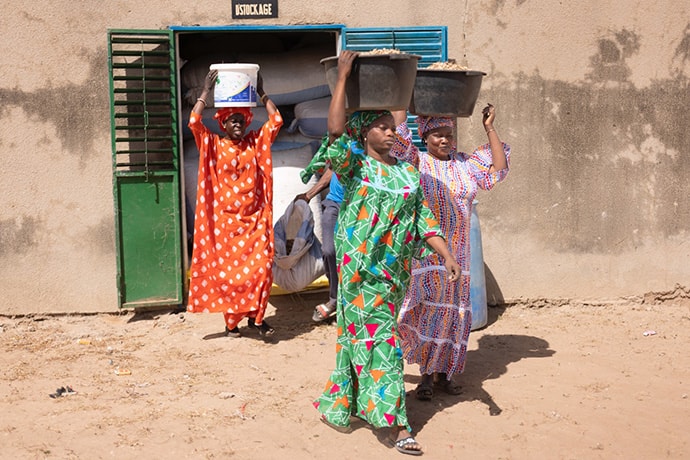
Ramata, left, collects peanuts for shelling with other members of the Saloum Corn Producers Association.
Beyond the ceremony’s gates lie miles of barren landscape, a sweep of dry earth pocked with dehydrated crops and craggy baobab trees.
The country’s location in the western Sahel — the semi-arid region between Africa’s Sahara Desert and tropics south of it — brings with it a burden for farmers, with climate change fueling exceptional extremes in both temperatures and weather patterns, including drought and intense rainfall.
As in many regions in Senegal, agriculture here is overwhelmingly subsistence farming, a hand-to-mouth livelihood characterized by additional limitations, including insufficient access to quality supplies, inadequate technical support and training, low access to finance, land degradation, poor infrastructure and poor market access.
Though 60 percent of Senegal’s workforce is employed in agriculture, the country still imports nearly 70 percent of its food, and poverty and food insecurity remain widespread in many rural areas.
But what the country lacks in formal systems to address challenges for farmers, it makes up for in the social force of Teranga.
Loosely translated into “hospitality” in the local Wolof language, Teranga refers to the deeply rooted Senegalese value of every person having a responsibility to care for the other.
“It goes beyond just welcoming warmly a stranger, friend, or relative at home,” explained Heifer Senegal Interim Country Director Daouda Ndao. “It means sharing your food, personal space, time, and many other services with a visitor or neighbor for free.”
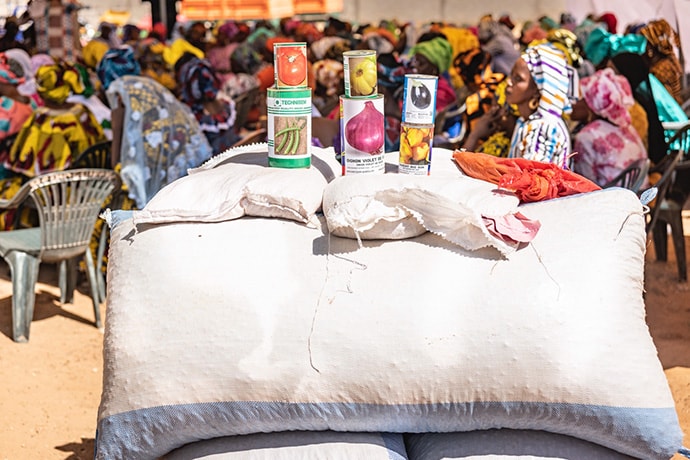
Sample of the seeds, fertilizers and corn offered during the ceremony.
This spirit of inclusion and solidarity is a ripe foundation for Heifer’s sustainable community development model, which includes the practice of Passing on the Gift and is focused on building a strong social fabric among individuals, allowing them to address challenges with a shared vision for the future.
“Many of our successfully implemented projects owe their impact to a favorable community environment driven by Teranga principles,” said Daouda. “We cheer this tradition furthermore through ceremonies where people can engage in supporting and giving back to the most vulnerable.”
Heifer Senegal has partnered with the Saloum Corn Producers Association on one such project — Climate Services for Increased Resilience and Productivity in Senegal — since 2021, working to help farmers improve production, adapt to climate change, increase food security and transition their farms from subsistence to businesses.
The Passing on the Gift ceremonies, promoted through the project, have tapped into the tradition of Teranga and motivated new farmers to join the association, said Nimna, allowing both it and Heifer to broaden their reach.
“Passing the gift is part of our culture,” she explained. “This donation can allow [someone] to get up and be at the same level, on the same footing as the members who were a little ahead of him. So, this donation is very important. It encourages us.”
“People are even jostling to be part of our association,” she added. “They know that every year we organize seed donation days. That is why everyone wants to be a member.”
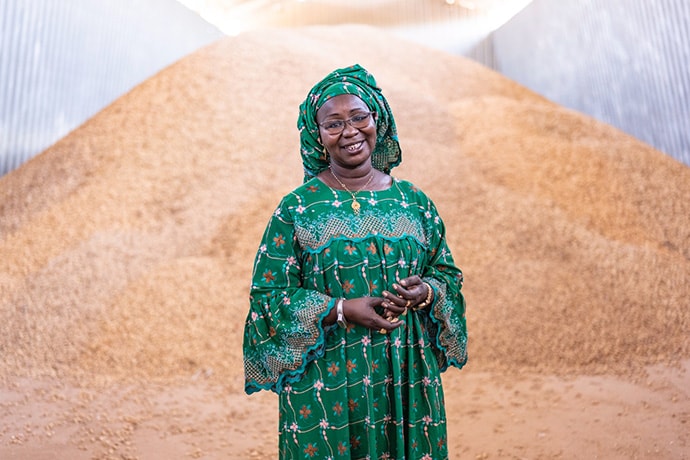
Nimna Diayte, president of the Saloum Corn Producers Federation, at the group’s peanut storage warehouse. Heifer works with the group to provide seeds, training and climate information services to its members.
As the association’s membership grows, more producers gain access to direct agricultural assistance, facilitated by Heifer, including high-quality seeds, climate and weather information, and the technical and business training needed to establish hearty farms and cope with the region’s vulnerabilities.
This support has also helped women members strengthen their collective businesses: growing vegetables and staple crops like corn, peanuts and sorghum and, together, processing them into higher-value products, including flour and oil, to sell in the local market.
“As the Wolof saying goes, ‘Strength is in unity, and what one can do, two can do better,’” said Ramata. “This is true for us.”
The group now has more than 2,500 members, and it has recently built a new storage facility for corn, acquired equipment for making peanut oil and obtained a loan from Heifer Impact Capital to grow its businesses.
Their success is built, in large part, on the trust and relationships forged through Passing on the Gift, shared Ramata.
“Between women, we have strings to motivate us,” she said, explaining how the practice has fostered mutual accountability, as well as encouragement for each other’s success.
If one person plants seeds, she said, neighbors hope for a good harvest because they know the gift will be passed on afterward.
“We all watch the field together.”
As the sun climbs higher at the day’s Passing on the Gift ceremony, Ramata prepares herself to participate.
“In the field of agriculture, we have difficulties in obtaining seeds,” she explained. But through Passing on the Gift, “this difficulty is being overcome little by little.”
She estimates 80 percent of the association’s members have been supplied with high-quality seeds this way.
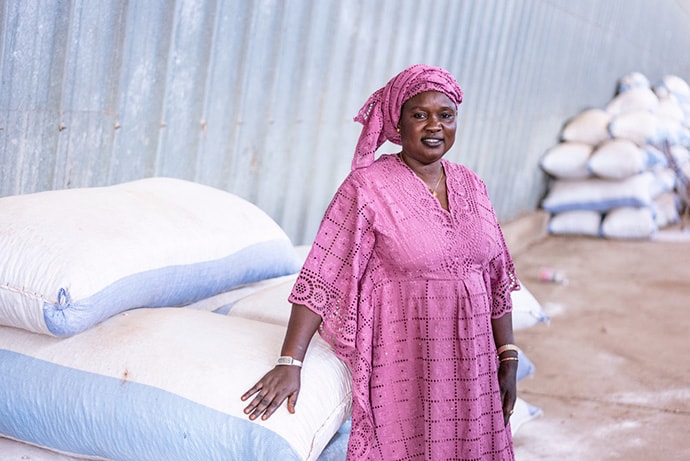
“How important it is to help one another, we don’t have enough words to express it,” Faty said. She will return next year to gift a portion of seeds from her harvest to someone else in her community.
And now, with the same sense of interconnectedness intrinsic in Teranga, Faty Omar Niass is being brought into the fold.
“The gift pass to me is like something that is given to you but you are not allowed to touch,” Ramata said, explaining that while those who receive are meant to reap the rewards of the contribution, they are also deeply entrusted to continue the tradition of giving.
As part of the ritual, the two women, Ramata and Faty, stand before the group, acknowledging the offering Faty will receive today — peanut, corn and vegetable seeds — to provide food and income for her family.
With the gift comes a vow not to break the chain of solidarity, and Faty readily accepts.
“We know where it starts,” she said, “but we don’t know where it ends.”
––––––
Heifer International’s Impact
Passing on the Gift is part of Heifer’s community development model, which works with individuals to identify shared goals and develop inclusive community responses to challenges. When people participate in Passing on the Gift, they receive knowledge, assets and other support to advance their livelihoods and make a commitment to share a portion with others in pursuit of collective prosperity.
Project participants have gifted nearly $1.5 million of tools, training, farm supplies, animals and other resources back to their communities in the past two fiscal years alone.